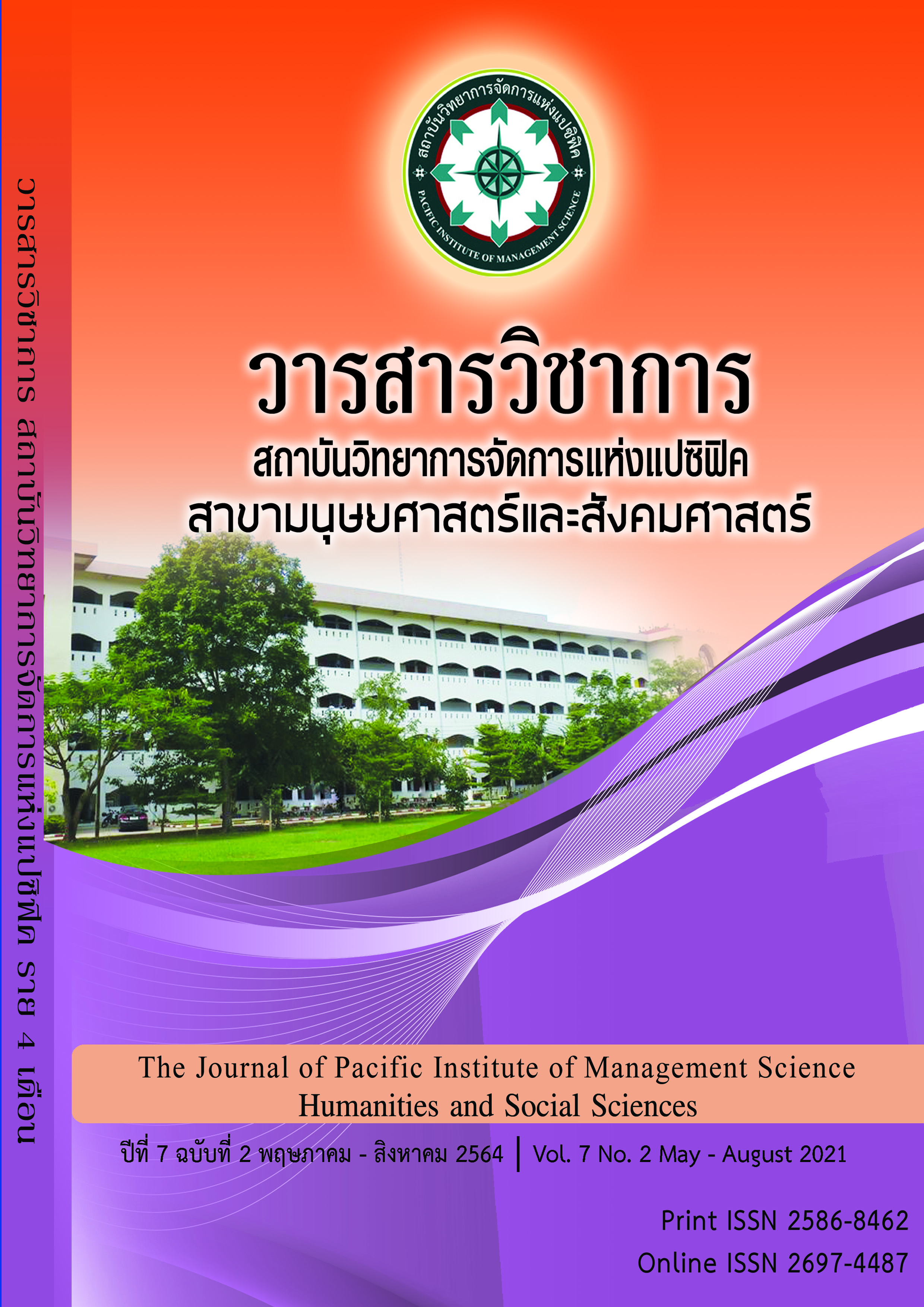The Development of a Task-based Learning and a Problem-based Learning Model to enhance Critical Business English Reading Skills for Undergraduate Students
Keywords:
A Task-based Learning and A Problem-based Learning Model, Critical Business English Reading SkillsAbstract
The purposes of the research were to: 1) study and develop of a Task based learning and a Problem based learning Model to enhance Critical Business English Reading for graduate students; 2) compare the students’ Critical Business English Reading abilities between before and after using the model; 3) investigate students’ opinions toward the model. The sample, selected by a simple random sampling technique, comprised 35 second year students who enrolled in Business English Reading courses, 1st semester, and academic year 2019, Muban Chom Bueng Rajabhat University. The students studied 8 learning units with Task based learning and Problem based learning approach to enhance Critical Business English Reading. Each unit was conducted in 6 hours and the experiment covered 52 hours in the total. The instruments used for this research consisted of: 1) A Task based learning and Problem based learning Model that consisting of 8 learning units; 2) an Critical Business English Reading achievement test, used as a pretest and posttest; 3) an questionnaire toward the instructional model. Mean and standard deviation of items were used to evaluate the students' opinions toward the instructional model. The paired-sample t-test was used to analyze the students' abilities in Critical Business English Reading abilities. The research findings were as follows: 1. the efficiency score of the Task based learning and the Problem based learning Model was 75.86/ 75.20, which is higher than the expected criterion: 75/75. 2. the students' Critical Business English Reading abilities after using the Task based learning and the Problem based learning Model were significantly higher at the .05 level. 3. the students' opinions toward the instructional model were mainly positive.
References
กระทรวงศึกษาธิการ. (2542).พระราชบัญญัติการศึกษาแห่งชาติ พุทธศักราช 2542 .กรุงเทพฯ:บริษัทสยามสปอรต์ ซินดิเคท จำกัด.
ชัยยงค์ พรหมวงศ์ และคณะ. (2520). ระบบสื่อการสอน. กรงเทพมหานคร: โรงพิมพ์จุฬาลงกรณ์มหาวิทยาลัย
ทองจันทร์ หงส์ลดารมภ์. (2538). การเรียนรู้แบบใช้ปัญหาเป็นหลัก (Problem based learning). วารสาร ข่าวสารกอง บริการการศึกษา. (58) : หน้า 5-25.
ทิศนา แขมมณี. 14 วิธีสอนสำหรับครูมืออาชีพ. กรุงเทพฯ : สำนักพิมพ์แห่ง จุฬาลงกรณ์มหาวิทยาลัย
ธิดารัตน์ สมานพันธ์. (2549). “ผลการใช้รูปแบบการสอนที่เน้นกระบวนการคิดอย่างมีวิจารณญาณและความยืดหยุ่นในการเรียนรู้ ต่อการพัฒนาความสามารถในการอ่านภาษาอังกฤษอย่างมี วิจารณญาณ”. กรุงเทพมหานคร: มหาวิทยาลัยขอนแก่น
ประกาศคณะกรรมการอุดมศึกษาเรื่อง นโยบายการยกระดับมาตรฐานภาษาอังกฤษในสถาบันอุดมศึกษา 2559 สืบค้นเมื่อวันที่ 7 มกราคม 2562 จาก http://www.mua.go.th/users/bhes/front_home/Data%20Bhes_2559/04052559
พนิตนันท์ บุญพามี. (2542). เทคนิคการอ่านเบื้องต้นสำหรับบรรณารักษ์. นครราชศรีมา: สถาบันราชภัฏนครราชศรีมา.
ยุพรพรรณ ตันติสัตยานนท์. (2555). “การพัฒนาโมดูลการอ่านภาษาอังกฤษธุรกิจที่เน้นจริยธรรมธุรกิจเพื่อส่งเสริมทักษะการอ่านอย่างมีวิจารณญาณและความตระหนักด้านจริยธรรมทางธุรกิจสำหรับ นักศึกษามหาวิทยาลัยเทคโนโลยีราชมงคลรัตนโกสินทร์”. Vol. 6 No. 1 (2013): ฉบับ มนุษยศาสตร์สังคมศาสตร์และวิทยาศาสตร์ (มกราคม - เมษายน 2556). มหาวิทยาลัยศิลปากร.
สำนักงานคณะกรรมการการศึกษาแห่งชาติ.(2544).การปฏิรูปการศึกษา: วาระแห่งชาติ.กรุงเทพฯ : บริษัทพิมพ์ดี จำกัด
สำนักงานเลขาธิการสภาการศึกษา กระทรวงศึกษาธิการ. (2557). แนวทางการพัฒนาการศึกษาไทยกับการเตรียมความพร้อมสู่ศตวรรษที่ 21. กรุงเทพฯ: บริษัทพริกหวานกราฟฟิคจำกัด.
สรณบดินทร์ ประสารทรัพย์. (2559). “การพัฒนารูปแบบการสอนแบบเน้นภาระงานร่วมกับการเรียนรู้ แบบร่วมมือ เพื่อเสริมสร้างทักษะการอ่านภาษาอังกฤษเชิงวิเคราะห์ และทักษะการเขียน ภาษาอังกฤษเพื่อการสื่อสาร”. วารสารบัณฑิตศึกษา : มหาวิทยาลัยราชภัฏสวนสุนันทา
สุวิมล ว่องวาณิช. (2550). การวิจัยปฏิบัติการในชั้นเรียน. กรุงเทพมหานคร: ศูนย์หนังสือ-จุฬาลงกรณ์มหาวิทยาลัย.
อัจฉรา วงศ์โสธร. (2544). การทดสอบและการประเมินผลการเรียนการสอนภาษาอังกฤษ.กรุงเทพฯ: สำนักพิมพ์จุฬาลงกรณ์มหาวิทยาลัย
Barrows, H. S., & Tamblyn, R. M. (1980). Problem-based learning. New York: Springer.
Bridges, E. M. and Hallinger, P. (1995). “Implementing problem based learning in leadershipdevelopment”. Eugene, Oregon: ERIC Clearinghouse on Educational Management.
Candlin, C. (1987). Towards task-based language learning. In D. Nunan (Ed)., Syllabus design. Oxford: Oxford University Press.
Duch B.J.,Groh S.E., Allen D.E. (2001). Why problem-based learning? A case study of institutional change in undergraduate education. In B. Duch, S. Groh, & D. Allen (Eds.). The power of problem-based learning (pp.3-11). Sterling, VA: Stylus
Dudley-Evans, T., & St. John, M. (1998). Developments in English for specific purposes: A multi-disciplinary approach. .Cambridge, United Kingdom: Cambridge University Press
Ellis, M., & Johnson, C. (1994). Teaching Business English. Oxford: Oxford UniversityPress.
Ellis, R. (2003). Task-Based Language Learning and Teaching. Oxford : Oxford University Press.
Estaire & Zanón, (1994). Planning Classwork. A Task-Based Approach. Heinemann.Ferguson, N. (1972). Some Aspects of The Reading Process. English Language
Frendo, E. (2005). How to Teach business English. England: Pearson Education Limited.
Hutchinson, A., & Waters, A. (1987). English for Specific Purposes: a learning-centered approach. Cambridge: Cambridge University Press.
Joyce, B. and Weil, M. .(2000). Models of Teaching. 6th ed. Massachusetts : Allyn & Bacon.
Littlewood, W. (2004). The Task-Based approach: Some Questions and Suggestions. ELT Journal,58 (4), 319. http://dx.doi.org/10.1093/elt/58.4.319
Nunan D. .(2004). Task–Based Language Teaching. Cambridge: Cambridge University Press
Paul, R. (1993). Critical Thinking: What Every Person Needs to Survive in a Rapidly Changing World. Melbourne: Hawker Brownlow.
Prabhu, N. S. (1987). Second language pedagogy. Oxford: Oxford University Press.
Schmidt, H. G., van der Arend, A., Moust, J. H., Kokx, I., Boon, L. (1993). “Influence of tutors' subject- matter expertise on student effort and achievement in problem- based learning”. Academic Medicine vol 68, no. 10, pp. 784-791.
Varaprasad, C. (1997). “Some classroom strategies:developing critical literacy awareness.” English Teaching Forum. 35, No.3, July.
Valette, R. M., & Disick, R. J. (1972). Modern Language Performance Objective and Individualization. New York: Harcourt Brace Javanovich.
Wallace, C. (1992). “Critical literacy awareness in EFL classroom”. In N. Fairclough (Ed.), Critical language awareness (pp 59–92). London: Longman.
Willis, Jane. (1996). A Framework for Task-Based Learning. Edinburgh: Longman.
Downloads
Published
Issue
Section
License
Copyright (c) 2021 Pacific Institute of Management Science

This work is licensed under a Creative Commons Attribution-NonCommercial-NoDerivatives 4.0 International License.
บทความที่ได้รับการตีพิมพ์เป็นลิขสิทธิ์ของ สถาบันวิทยาการจัดการแห่งแปซิฟิค
ข้อความที่ปรากฏในบทความแต่ละเรื่องในวารสารวิชาการเล่มนี้เป็นความคิดเห็นส่วนตัวของผู้เขียนแต่ละท่านไม่เกี่ยวข้องกับสถาบันวิทยาการจัดการแห่งแปซิฟิค และคณาจารย์ท่านอื่นๆในสถาบันฯ แต่อย่างใด ความรับผิดชอบองค์ประกอบทั้งหมดของบทความแต่ละเรื่องเป็นของผู้เขียนแต่ละท่าน หากมีความผิดพลาดใดๆ ผู้เขียนแต่ละท่านจะรับผิดชอบบทความของตนเองแต่ผู้เดียว







